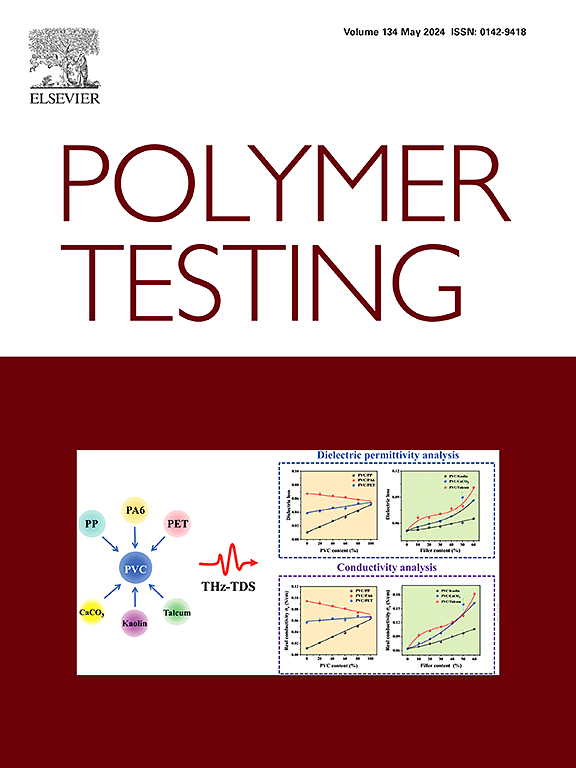后处理对聚羟基丁酸酯(PHB)单体共混物的影响
IF 6
2区 材料科学
Q1 MATERIALS SCIENCE, CHARACTERIZATION & TESTING
引用次数: 0
摘要
本研究研究了生物基和可生物降解聚合物聚羟基丁酸酯(PHB)的机械回收,研究了一次挤压(E) PHB与原生(V)材料以两种比例(E20V80和E80V20)混合,并进一步挤压五次(E5),在每个阶段的不同性能。对于这两个系列,热分析显示一个稳定的熔化和分解温度,即使经过五个再处理循环和略有下降的结晶度。E80V20系列的抗拉强度几乎保持不变,仅从E3观察到下降。断裂应变从E80V20下降到E5,这一点得到了Charpy缺口冲击结果的证实,表明试样脆性呈递进趋势。E20V80表现出与E80V20系列相似的趋势,但在冲击强度上具有更高的值,仅在拉伸强度上有所不同,从E20V80到E1观察到增加,仅在E4观察到下降。流变学研究表明E80V20系列粘度变化趋势不明显,但在E20V80中,粘度随每个加工周期的变化而下降。因此,在实际的基础上,在再加工的材料中添加少量的原始材料是可行的,只需要注意加工参数(因为粘度低)。本文章由计算机程序翻译,如有差异,请以英文原文为准。
Influence of reprocessing on monopolymer blends of polyhydroxybutyrate (PHB)
This work addresses the mechanical recycling of the biobased and biodegradable polymer Polyhydroxybutyrate (PHB) by investigating different properties at each stage from once extruded (E) PHB blended with virgin (V) material in two ratios (E20V80 and E80V20) and further extruded five times (E5). For both series, thermal analyses revealed a stable melting and decomposition temperature even after five reprocessing cycles and a marginally decreased crystallinity. The tensile strength remained almost constant for the series E80V20 with a drop observed only from E3. Strain at break decreased from E80V20 to E5, which was corroborated by Charpy Notched Impact results showing a progressive sample brittleness. E20V80 showed similar trends to the E80V20 series, but with higher values in the impact strength and only differed in the tensile strength in which an increase was observed from E20V80 to E1 and a drop observed only at E4. Rheology studies showed an indistinct trend for the E80V20 series, but in E20V80, the viscosity dropped with each processing cycle. Hence, on a practical basis adding lesser quantities of virgin material to the reprocessed material is feasible with attention need only be given to the processing parameters (as viscosity is low).
求助全文
通过发布文献求助,成功后即可免费获取论文全文。
去求助
来源期刊

Polymer Testing
工程技术-材料科学:表征与测试
CiteScore
10.70
自引率
5.90%
发文量
328
审稿时长
44 days
期刊介绍:
Polymer Testing focuses on the testing, analysis and characterization of polymer materials, including both synthetic and natural or biobased polymers. Novel testing methods and the testing of novel polymeric materials in bulk, solution and dispersion is covered. In addition, we welcome the submission of the testing of polymeric materials for a wide range of applications and industrial products as well as nanoscale characterization.
The scope includes but is not limited to the following main topics:
Novel testing methods and Chemical analysis
• mechanical, thermal, electrical, chemical, imaging, spectroscopy, scattering and rheology
Physical properties and behaviour of novel polymer systems
• nanoscale properties, morphology, transport properties
Degradation and recycling of polymeric materials when combined with novel testing or characterization methods
• degradation, biodegradation, ageing and fire retardancy
Modelling and Simulation work will be only considered when it is linked to new or previously published experimental results.
 求助内容:
求助内容: 应助结果提醒方式:
应助结果提醒方式:


